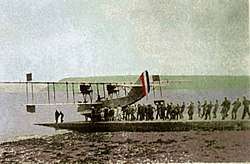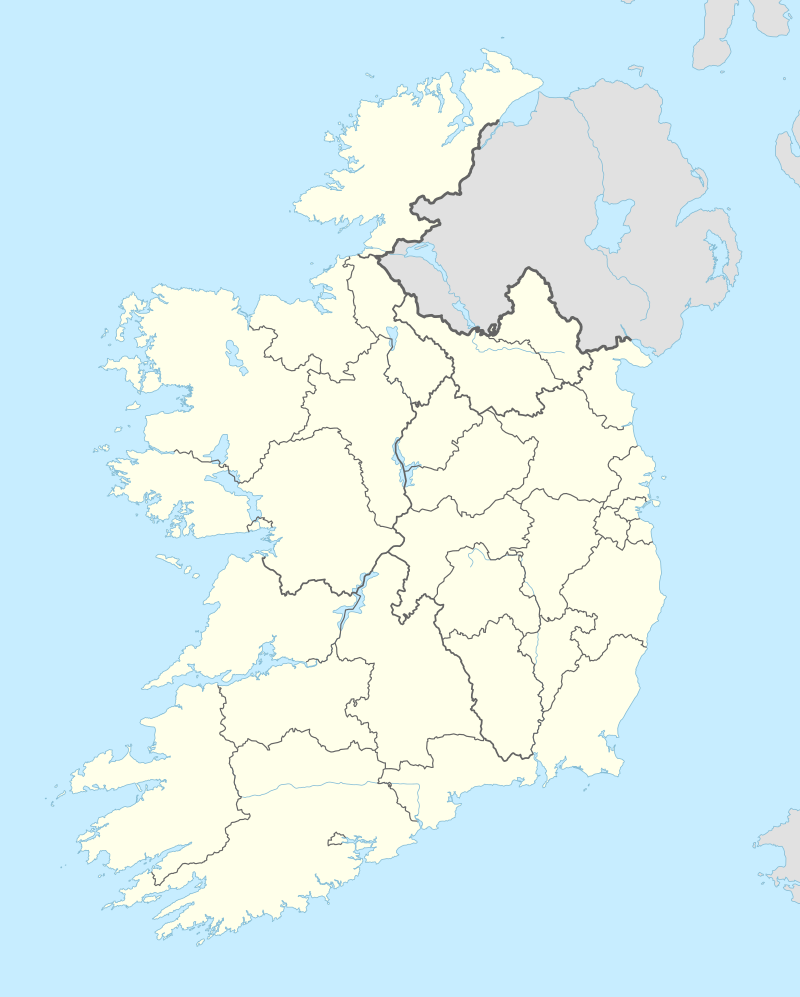U.S. Naval Air Station Queenstown Ireland
United States Naval Air Station Queenstown was the first US Naval Air Station established in Ireland. NAS Queenstown was close to the village of Aghada on the eastern side of Cork Harbour (across the harbour from Queenstown/Cobh). NAS Queenstown was commissioned on 22 February 1918 with LCDR Paul J. Peyton, USNRF, Naval Aviator 47 in command.[1][2]
NAS Queenstown | |
|---|---|
 Aircraft on slipway at Aghada | |
| Summary | |
| Airport type | Military |
| Operator | United States Navy |
| Location | Aghada, County Cork, Ireland |
| Built | 14-Feb-1918 |
| In use | 1918-1919 |
| Elevation AMSL | 3 ft 3 in ft / 1 m |
| Coordinates | 51°50′N 8°13′W |
| Map | |
 NAS Queenstown Location in Ireland | |
.jpg)
History
At the start of America's involvement in the First World War, five sites in Ireland - Queenstown, Wexford, Lough Foyle, Whiddy Island and Berehaven - were identified to be operated by the United States Navy in support of allied operations against enemy submarines.[3] This station supplied patrols and convoys from Cape Clear on the west, south into the English Channel to the sector covered by the aerial patrols from the north coast of France, and southeast and east to the sectors covered by the stations in the southwest of Wexford and England.[3]
On 14 February 1918, LCDR Frank R. McCrary, USN, Commanding Officer of U. S. Naval Aviation Detachment in Ireland, during World War 1,[4] was headquartered at the location throughout the war. [3]
The Queenstown/Aghada base was built on lands commandeered under the Defence of the Realm Act 1914.[5]
Operations
The base's six hangars and three slipways were operational by September 1918.[6][7] It operated as a seaplane base, assembly and repair location for aircraft, and as a training station for pilots.[8]
The station's aircrews, using Curtiss H-16 flying boats would fly a total of 64 war patrols and record three bombing attacks against German submarines.[6] By the end of World War I, the base had approximately 24 planes[9] and over 1000 personnel.[5]
End of hostilities and closure
With the end of the war, the U.S. Naval Air Stations Anti-submarine warfare patrols in Ireland were discontinued and all aircraft grounded and disarmed. Armistice was on 11 November 1918, and NAS Queenstown closed 20 April 1919[10] - although some remnants of the slipway remain.
See also
References
- Flying Officers of the U.S.N. 1917-1919. Washington DC: Naval Aviation War Book Committee. 1919. p. 300. Retrieved 22 January 2013.
- Treadwell, Terry C (2000). America's First Air War: The United States Army, Naval and Marine Air Services in the First World War. MBI Publishing Company. ISBN 9780760309865.
- Sitz, W.H. (1930). A History of U.S. Naval Aviation (PDF). Washington DC: U.S. Government Printing Office. p. 27.
- Loomis, Steven. "Together We Served McCRARY, Frank". Together We Served. Retrieved 22 April 2018.
- Ronald V. "Abandoned, Forgotten & Little Known Airfields in Europe". Archived from the original on 28 December 2014.
- Martin, Emily. "Naval Air Station Queenstown, Ireland 1918". U.S. Naval Institute. U.S. Naval Institute. Retrieved 22 April 2018.
- John Abbatiello (2006). Anti-Submarine Warfare in World War I: British Naval Aviation and the Defeat of the U-Boats. Routledge. p. 125. ISBN 1135989540.
- Karl E. Hayes (1988). A History of the Royal Air Force and the United States Naval Air Service in Ireland 1913-1923. ISBN 0950823112.
- Denby, Honorable Edwin (1923). The American Naval Planning Section London. Washington Printing Office. p. 106.
- "World War 1 Era Naval Air Stations". Bluejacket.com. Retrieved 22 April 2018.
External links
- Conflict Landscapes 1: The WW1 U.S. Naval Air Station, Aghada, Co. Cork (Documentary video). Damian Shiels. April 2016. Length 6m20s – via YouTube.